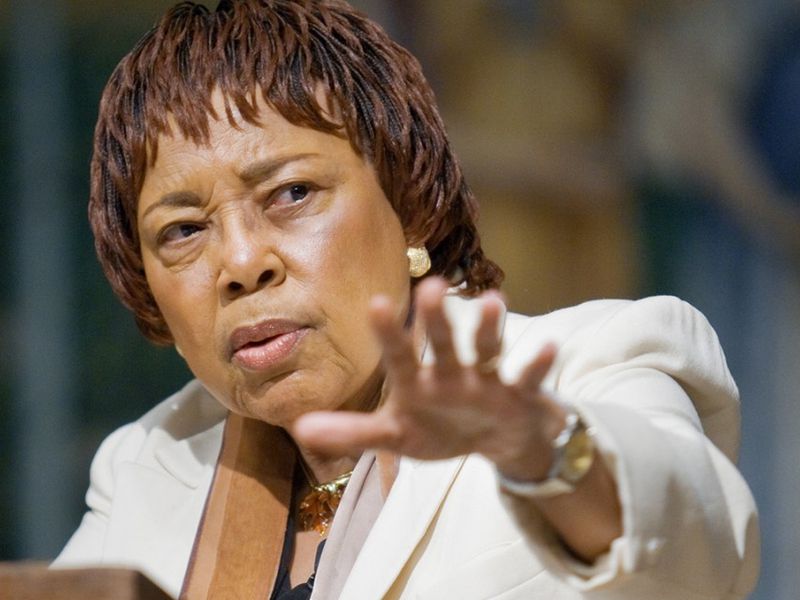
Dorothy Cotton at Cornell University, Cornell Daily Sun
The late Dorothy Foreman Cotton (June 9, 1930 – June 10, 2018) is among the most important unsung leaders of the Civil Rights Movement, having worked closely with Dr. Martin Luther King Jr. and with other women whose roles in the movement have often been overlooked. As director of the Citizenship Education Program of the Southern Christian Leadership Conference, she led workshops that moved thousands of Black people into civic action and organizing. She also helped to organize marches and protests to end segregation, in the process suffering beatings by white supremacists. Cotton was a firm believer in the philosophy of nonviolence as a way of life that “required self-discipline, bravery, compassion, and conscience”
Residing in Ithaca since 1982, on these traditional homelands of the Gayogo̱hó:nǫˀ (Cayuga Nation), Cotton served as director of student activities at Cornell from 1982 to 1991. In 2008, Cotton helped found the Dorothy Cotton Institute. She cared deeply about the current state of affairs and how to contribute to a 21st century movement for human life, dignity, and freedom around the world. We at DCI find great hope and inspiration in the solidarity and persistence of those who build paths toward peace rather than war, oppose violations of human rights wherever they occur, and strengthen hope that another way to live together is not only possible, but imperative.
During these consequential times, we share her reflection on what she learned about movement-building and organizing for freedom.
In Dorothy Cotton’s (2012) own words:
One day not long ago I felt a strong desire to revisit the Dorchester Center [in Georgia], where great, important work happened – work that helped change our country…. As I stood in the room where we gathered regularly each month for eight years, I saw and felt the energy of those times again …. I was not conscious then of the great importance of our work, that it would be studied and written about for generations to come. We had a fire in our souls and just had to do what we did. I know now that when I took other jobs, I was just taking a break from what I was called to do. I was transformed forever, just as our eight thousand participants were also transformed by involvement in a people-changing, country-changing experience.
Standing in the great room at the Dorchester Center caused me to consider some specifics of what we learned there:
♦ We learned that we could make the road by walking it. We didn’t know everything up front. There was no blueprint.
♦ We learned that we had, and still have, more power than we knew. The more we got involved, acted, and came together, the stronger we felt. We realized a new definition of power.
♦ We learned that we could change patterns and structures, no matter how deeply entrenched they were.
♦ We learned that we could use our impatience and anger to empower ourselves to act for change.
♦ We learned that we could confront the powers that be from an understanding of nonviolence—satyagraha, as Mahatma Gandhi called it.
♦ We learned that we could develop whatever skills we lacked when there was work to be done.
♦ We learned that we could act from our capacities, rather than from some deficit attributed to us by others.
♦ We learned that we have government “by the people” only if we make it so, giving life to this great concept.
♦ We learned that one is not alone. If one takes some steps to bring about positive change, others will join in the action.
♦ We learned that when we are serving, giving our life and energy to something that is important to us as well as to others, life is meaningful. And that we can’t be bored giving ourselves to positive, transformative work.
♦ We learned that our freedom struggle was an idea whose time had come. As Dr. King liked to say, “The zeitgeist was upon us.” The spirit of the times unfolded with breathtaking power.
♦ We learned that when those who are victimized become committed to changing an unjust and brutal system, no longer accepting victim status, change happens. Systems that maintain patterns of injustice will have to change.
Source: Dorothy F. Cotton, If Your Back’s Not Bent: The Role of the Citizenship Education Program in the Civil Rights Movement, Atria Books, 2012, pp. 279-84.
The Dorothy Cotton Institute: https://www.dorothycottoninstitute.org/
DCI is a project of the Center for Transformative Action.
Today is June 9. Had she lived, this would be Dorothy Foreman Cotton’s 93rd birthday. Even now, her well-deserved stardom is rising.
Through our documentary Move When the Spirit Says Move: the Legacy of Dorothy Foreman Cotton, she is continuing to teach, affirm and motivate people with her life story, the narratives of her colleagues, friends and family, and most powerfully, her own voice.
The film is a collaboration between the Dorothy Cotton Institute and filmmakers Deborah Hoard and Ry Ferro at PhotoSynthesis Productions (PSP). You can read about our team and see a full and growing list of film festivals where the documentary has been or will be featured. This film has a big impact on people, and viewers have commented that it should be seen by all students and teachers.
Here in Ithaca, MOVE it had its east coast premier in April at the Finger Lakes Environmental Film Festival (FLEFF) for a two-week run at indie film house Cinemapolis, then was back by popular demand for a week-long encore in May. We are excited that through the generosity of the Ithaca City School District, the Park Foundation, and the support of a large number of individual donors, over 300 high school students, teachers, and a group of Seniors in our community have been able to see the film for free. Yesterday morning and today, around 230 students from Lehman Alternative School and Ithaca High School saw Move When the Spirit Says Move with their teachers. We are truly delighted and hope to hear about the young people’s experiences.
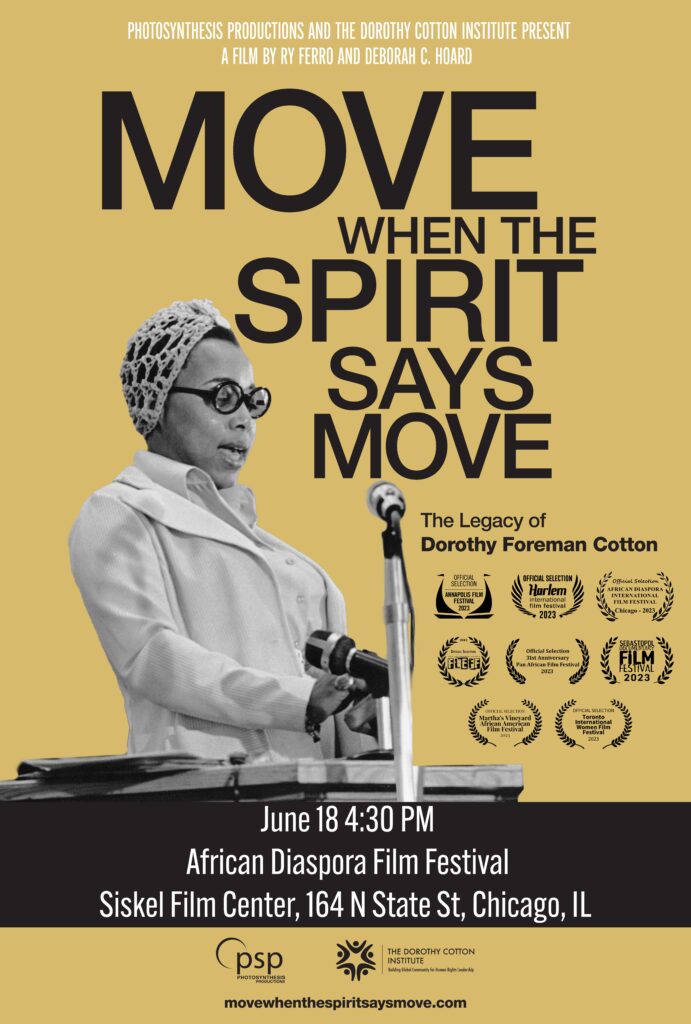 Beyond Ithaca, Dorothy Cotton’s story has moved and inspired activists and educators at a number of special screenings: for Civil and Human Rights icons and foot soldiers at the National Council of Elders; for the Highlander Research and Education Center’s 90th anniversary and with their support, at a conference of Folk Schools in Copenhagen; for the Children’s Defense Fund Freedom School training; and this month, at Juneteenth celebrations at Colorlines.com, the African Diaspora Film Festival in Chicago, and the Nashville African American Music Museum.
Beyond Ithaca, Dorothy Cotton’s story has moved and inspired activists and educators at a number of special screenings: for Civil and Human Rights icons and foot soldiers at the National Council of Elders; for the Highlander Research and Education Center’s 90th anniversary and with their support, at a conference of Folk Schools in Copenhagen; for the Children’s Defense Fund Freedom School training; and this month, at Juneteenth celebrations at Colorlines.com, the African Diaspora Film Festival in Chicago, and the Nashville African American Music Museum.
At the SCLC, Dorothy’s work with Septima Clark and Andrew Young brought the powerful Citizenship Education Program classes to thousands of people throughout the southern states, struggling to end legalized segregation under Jim Crow laws. Their influence and courage in organizing to end American-style Apartheid led to the historic 1964 Civil Rights Act. and the 1965 Voting Rights Act, which we will be commemorating and celebrating this August 6th. We believe that Dorothy would be so very proud that her remarkable legacy is alive and moving people who had never heard about her. We also believe that this film contributes a compelling affirmation of the power of education, our right to know our rights, and to know and truthfully teach our American history.
“We are all diminished when the rights of any are violated. We will thrive as individuals and as a collective when all our rights are protected and respected. The movement for human rights is a story about all of us, opening up a space for the beloved community”.
(Dorothy Cotton, If your Back’s Not Bent, 2012: p.322)
Don’t miss the long-awaited East Coast premier of our documentary! It is part of the:
Running Time: 87 min
A featured in-person screening of at Cinemapolis, Saturday, March 25, 7 p.m.
PSP filmmakers Ry Ferro and Deborah C. Hoard, and DCI Project Director Laura Branca will be present for Q & A, along with other special guests.
Ticketed event.
Dorothy Foreman Cotton was a bold and highly effective civil rights leader, who educated thousands in their citizenship rights and inspired generations of activists with her powerful freedom songs and her leadership. SCLC’s Education Director, and the only woman on Dr. Martin Luther King Jr.’s executive staff, Dorothy was a charismatic, courageous and consistently overlooked key player in the Civil Rights Movement.
East Coast Premiere will be on 3/25, and Move when the Spirit Says Move with be at Cinemapolis through April 7, for a 14-day run. Tickets available to the public at Cinemapolis.
On Friday, February 10, at 6:45 pm PT, our documentary, MOVE WHEN THE SPIRIT SAYS MOVE: THE LEGACY OF DOROTHY FOREMAN COTTON, directed and produced by PhotoSynthesis Productions, premiered as an opening night selection at the Pan African Film Festival at the Cinemark Baldwin Hills Crenshaw Plaza 15 and XD in Los Angeles, with an encore screening on February 11.
The documentary chronicles the life of DCI’s distinguished fellow and co-founder, Dorothy Foreman Cotton, and her inspiring, courageous work for civil and human rights. The film is directed by Ry Ferro (RIZE UP, THERE’SYOUR READY GIRL, RE:THINKING) and Deborah C. Hoard (RIZE UP, THEY CALL IT MYANMAR, CIVIL WARRIORS).
Dr. Cotton was the only woman on Dr. Martin Luther King, Jr.’s executive staff. The film includes insights, commentary, reflections, and recounts from notables such as Ambassador Andrew Young and Bernard Lafayette, both of whom worked closely with Dorothy Cotton and Dr. King at the Southern Christian Leadership Conference), Latosha Brown, founder of Black Voters Matter, and Ash-Lee Woodard Henderson (Highlander Research and Education Center), civil rights leader Rev. Carolyn Maul McKinstry, Mrs. Aljosie Harding of the National Council of Elders, and Stanford historian and founder of the Martin Luther King Research and Education Institute, Dr. Clayborne Carson.
“We are honored to bring Dorothy’s story to the world during a time when democracy is being threatened,” said Deborah Hoard, producer and director. “Her legacy can help us to recognize our power as citizens and use it to bring about the change we seek.”
The film has been a collaboration between PhotoSynthesis Productions and the Dorothy Cotton Institute (DCI). DCI was founded by Dorothy Cotton and her colleagues in 2007 in Ithaca, NY. DCI offers human rights education and training in civic engagement, based on the philosophy and practices of nonviolence, reconciliation, restoration, and leadership development.
The Pan African Film and Arts Festival in Los Angeles (PAFF) presents and showcases a broad spectrum of Black creative works, particularly those that reinforce positive images and help to destroy negative stereotypes of Africans and African Americans. Since 1992, PAFF has remained dedicated to the promotion of Black stories and images through the exhibition of film, visual art, and other creative expression. Today, PAFF is one of the largest and most prestigious Black film festivals in the U.S. and attracts local, national, and international audiences. In addition, it is an Oscar-qualifying festival for animation and live-action films, and one of the largest Black History Month events in America. We are thrilled that Move When the Spirit Says Move played to a sold-out audience and producer Deborah Hoard and director Ry Ferro were honored by a surprise special guest. Civil rights activist and leader, Rev. James Lawson came to the screening and loved the film, and he expressed that it is so needed now.
This March, 2023, Move When the Spirit Says Move will be shown on March 18 at the Sebastopol Documentary Film Festival. The film has been nominated to the Toronto International Women Film Festival. There will be a special screening in Goldsboro, NC, Dorothy Cotton’s home town, and a special in-person screening in downtown Ithaca, NY on March 25 at the Finger Lakes Environmental Film Festival (FLEFF) at Cinemapolis.
In January 2021 at a Stanford University film festival, themed Where Do We Go From Here, and in April 2021, in partnership with Tompkins County The History Center in celebration of Black Women’s History Month, the Dorothy Cotton Institute gave virtual screenings of THERE’S YOUR READY GIRL! This is a short film by Deborah Hoard of PhotoSynthesis Productions which was produced during the pandemic with footage from the feature-length documentary currently in production, MOVE WHEN THE SPIRIT SAYS MOVE, about Dorothy’s life and legacy. THERE’S YOUR READY GIRL! has won two prestigious awards this year:
First Place in the Social Issues Documentary category in the New York Women In Film and Television (NYWIFT) Online Shorts Festival! THERE’S YOUR READY GIRL! is available to watch on YouTube. The 11 minute documentary tells the story of Dorothy Foreman Cotton – a bold, highly effective and important civil rights leader. Throughout her long life she organized, she spoke out, she challenged the status quo, she sang powerful freedom songs. Most importantly, she ran a Citizenship Education Program that moved thousands of people from a mindset of “victim” to that of a fully-engaged citizen in the Jim Crow south. She was the only woman on Dr. Martin Luther King Jr.’s Executive Staff, yet her contributions have largely gone unrecognized.
THERE’S YOUR READY GIRL! has also won a Bronze Telly Award! The Tellys are a very large competition with lots of categories – we won in Non-broadcast Social Responsibility. https://www.tellyawards.com/
“The Telly Awards is the premier award honoring video and television across all screens. Established in 1979, The Telly Awards receives over 12,000 entries from all 50 states and 5 continents. Entrants are judged by The Telly Awards Judging Council—an industry body of over 200 leading experts including advertising agencies, production companies, and major television networks, reflective of the multiscreen industry and includes executives from Dow Jones, Duplass Brothers Productions, Complex Networks, A&E Networks, Hearst Media, ESPN Films, RYOT, Vice+ and Vimeo. Winners are selected for recognition based on excellence in the following areas: Branded Content, Commercials & Marketing, Immersive & Mixed Reality, Non-Broadcast, Series / Shows / Segments and Social Video.”
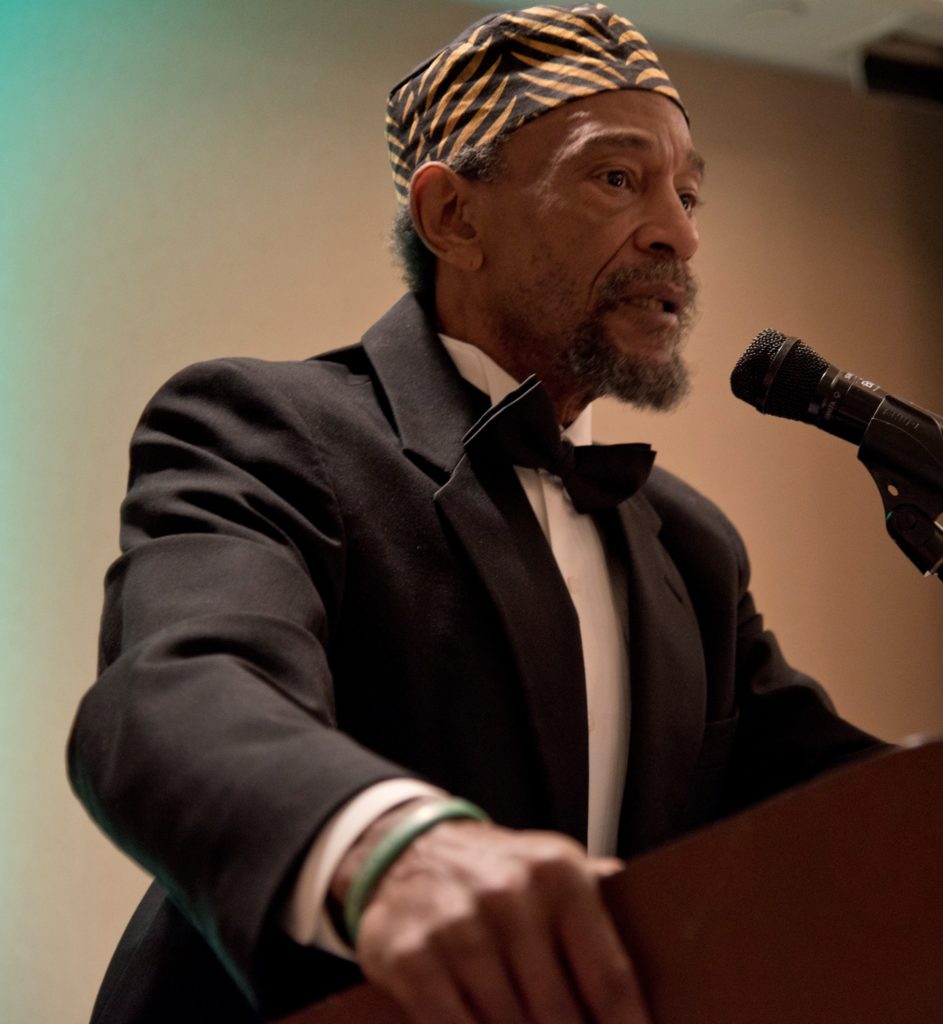
Kirby Edmonds, DCI Human Rights Day Gala, Dec. 2018; photo by Kathy Morris
Ithaca – Kirby V. Edmonds, 69, of Ithaca, New York died peacefully on August 22, 2020 in the company of his loving family. He was born on August 17, 1951 in Huntsville, Texas. As a youth he was educated in Glastonbury, Connecticut, Nairobi, Kenya, and Beirut, Lebanon. He held two degrees from Cornell University, a B.A. in History and an M.P.A.
Kirby was a mighty river that flowed through our community and far beyond, watering the positive seeds of possibility. He led in countless ways: as Managing Partner of TFC Associates (Training for Change), as Senior Fellow and Program Coordinator of the Dorothy Cotton Institute (DCI), co-founder of the Building Bridges network, and as lead facilitator in development of the City of Ithaca Comprehensive Plan. He functioned behind the scenes as a coach, mentor, encourager, and backbone in several collective impact initiatives, for example, as Coordinator of the Cradle to Career, as Chair of the Ultimate Reentry Opportunity Advisory Committee and by supporting the Childhood Nutrition Collaborative, community involvement in Ithaca’s Green New Deal, and family engagement in My Brother’s Keeper Ithaca.
Early in his career Kirby set up a drug and alcohol crisis hotline and became a trainer in prevention and treatment systems. He developed a deep understanding of groups, the dynamics of oppression, and the challenge of getting well in an unhealthy society. He worked on the cutting edge of education and training for people in recovery becoming community-based practitioners equipped to lift up and assist others struggling with addiction. A foundation of his practice in whatever action was at hand was to champion people most directly affected by oppression and inequity.
In 1981, Kirby co-founded Training for Change (TFC Associates) to support healthy organization development, collaborative leadership, and to eliminate racism and all forms of oppression. Over a 33-year creative partnership in TFC and later DCI, Kirby Edmonds and Laura Branca built a far-reaching practice and shared mission, true to the taproots of anti-oppression, social justice, human rights, educational equity, cultural competency, and the power of collective endeavor. Kirby was brilliant at interweaving and operationalizing these ideas. Between 2007-2015 Kirby and Laura designed and facilitated the original Multicultural Resource Center’s Talking Circles on Race and Racism. For three decades, Kirby volunteered as a mediator and coach for the Community Dispute Resolution Center. As a Senior Fellow at DCI, he championed a vision of a global human rights movement achieving the full realization of human dignity, justice, and freedom for all.
In 2014 Kirby and a cadre of community leaders attended Tamarack Institute’s Collective Impact (CI) Conference in Toronto and brought back models for achieving big audacious community goals. Right away Building Bridges took up leadership, often without compensation, to get powerful and lasting CI initiatives going. Only days before his death, Kirby was on Zoom calls from his hospital bed, fulfilling his long-term commitment to these and other initiatives as organizer, facilitator, and coordinator.
Kirby was everywhere. Kirby worked with indigenous people in the Northwest Territories and was a co-founder of Human Rights Educators USA (HRE USA). In the 1980s he led anti-oppression workshops for Cornell’s Human Relations Training Program. Kirby was bravely willing to go toward conflict situations, as when he mediated a volatile land use dispute in Ghana for World Vision. He was a close colleague and champion of civil rights leader Dorothy Cotton, co-founding the Dorothy Cotton Institute and doing everything in his power to promote her legacy of non-violent direct action. In 2012 he helped DCI bring a delegation of 23 civil and human rights activists and scholars to Israel-Palestine to meet with Palestinians and their Israeli allies non-violently resisting the Occupation in the West Bank.
Kirby described himself as a community organizer. He was that in practice and through the strategies he used, seeking funds to pay other community-based organizers to engage and empower their neighbors. He was a master network manager, able to weave together many strands of relationship through his persistent willingness to show up with a shared purpose on his mind. Everywhere that people of good will united to tackle problems or cultivate opportunities, Kirby was quickly pulled into the center. He took on many roles– contributor, connector, or designated leader, but always encouraged folks to plan actions that would get more power and resources into the people’s hands. Soft spoken and kind, Kirby was skilled in the art of posing incisive questions, ever asking folks to consider who else should be at the table. He had a keen understanding of power and the courage never to shy away from issues of violence, racism, poverty, hunger, and intergroup conflict.
Kirby was a builder of movements and a peaceful warrior for human rights. He had almost limitless vision, determination, and optimism. He sought and created possibilities for many people, paved avenues for positive change, and drew others in with his quiet, unflappable confidence. He was an exceptional singer-songwriter who had three bands in Ithaca. He loved music, enjoyed dancing, jig-saw puzzles, reading sci-fi, and watching baseball and football games with his son. And in his off hours, he was often painting and renovating houses. He was a valiant leader and a giant in his community.
He is survived by his wife, Judith Scherer and sons, Quincy J. Edmonds, and Ramsey M. Edmonds of Ithaca; his mother, Doris Edmonds, his sister Katree Edmonds, and was pre-deceased by his father, George Freddie Edmonds of Albuquerque, New Mexico. And, by his partner and comrade, Laura Branca of Ithaca.
Information will be shared in the future about a memorial celebration of his life. All who were blessed to know, admire, and love him miss him greatly.
Cards and notes may be sent to the Dorothy Cotton Institute, PO Box 321, Ithaca, NY 14851. In lieu of flowers, donations may be made by check payable to The Center for Transformative Action with “DCI” in the memo line, and mailed to Dorothy Cotton Institute PO Box 321, Ithaca, NY 14851
or you may donate online at https://www.givegab.com/donations/new?group_id=dorothy-cotton-institute
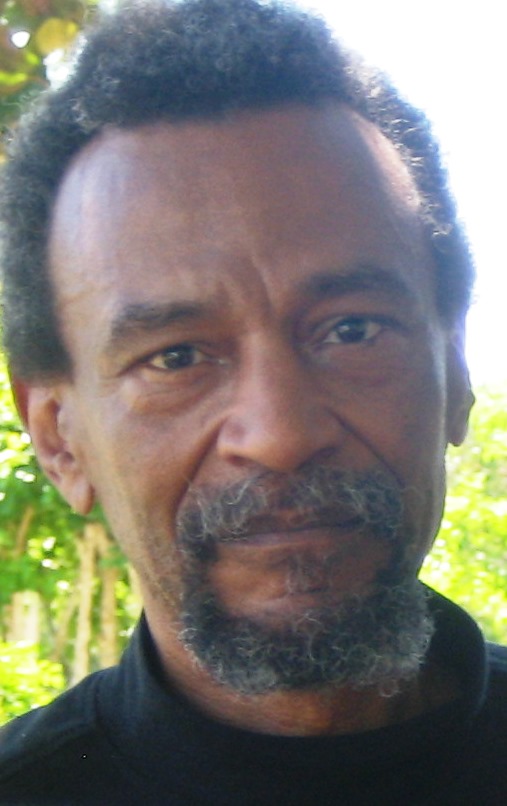
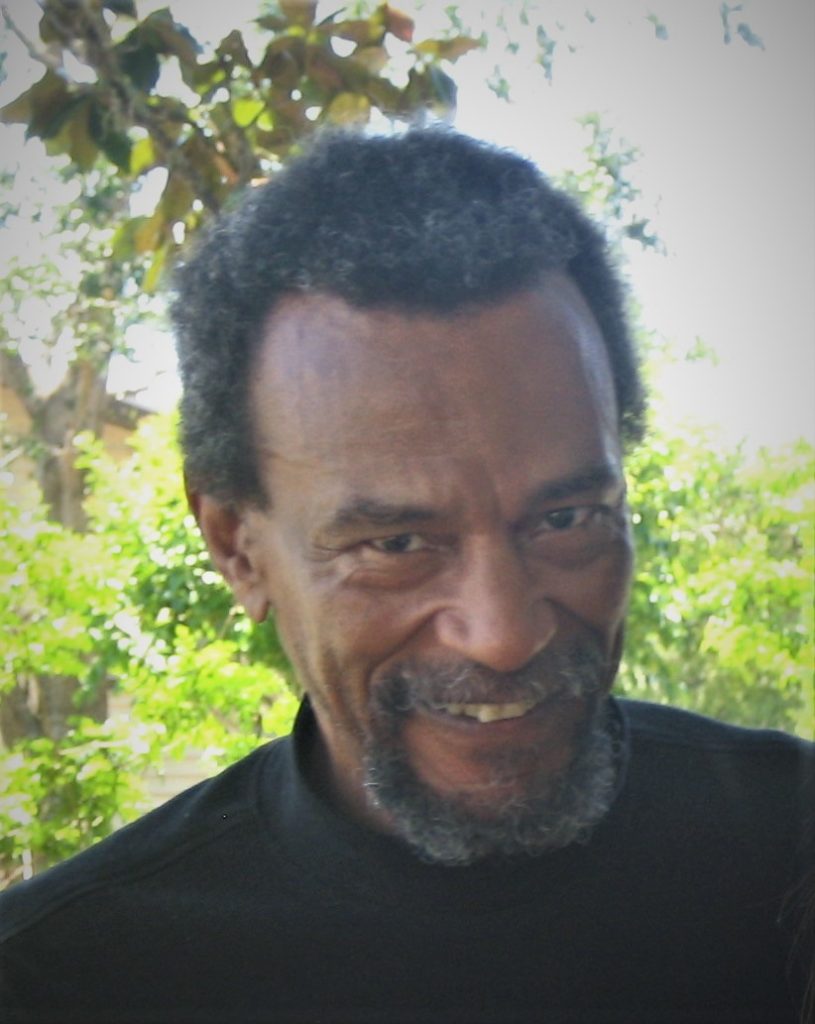
It is with immense sorrow that we let you know that Kirby Edmonds died on August 22, 2020 due to complications arising from a serious heart attack he suffered in July.
He passed away peacefully in the company of his family. Among his many leadership roles, Kirby was Managing Partner of TFC Associates (Training for Change), Senior Fellow and Program Coordinator of the Dorothy Cotton Institute, (DCI), and Coordinator of the Cradle to Career collective impact initiative.
Information will be shared in the future about a memorial service and celebration of his life. He is greatly missed by us all.
Cards and letters may be sent to:
TFC Associates or the Dorothy Cotton Institute
PO Box 321
Ithaca, NY 14851
To our friends, colleagues and neighbors,
In these extraordinary times it is important to notice and celebrate the strength, compassion and courage of our community.
In a very short time this community has managed to organize to get people fed and cared for, and to protect our children and continue their education.
People are coming together to communicate in unprecedented ways in spite of the need to avoid in-person gatherings.
Our leadership has stepped up to confront the racist anti-Asian incidents that have taken place with the clear message that these ignorant, hateful behaviors must stop.
Our people are demonstrating that it is indeed possible for us to care for one another and to think about meeting the needs of all of us.
Even as we are asked to work from home if we can, many of us continue to work in essential jobs to provide for the safety and support of our community, serving the public while risking exposure, and frequently absorbing the frustration and anxiety of their customers.
People are showing remarkable kindness, generosity, ingenuity and sacrifice. Even as social distancing is the soup du jour, we’re also learning to center solidarity over charity in how we keep one another alive.
While this crisis will eventually pass, let us resolve to maintain the community connections, and strengthen our capacity to care for and sustain one another. Things will never get back to normal, but we can make this our new business as usual.
Take good care of yourselves, stay healthy and stay connected.
Your friends at DCI
Please help the Dorothy Cotton Institute produce a feature-length documentary
https://www.givegab.com/campaigns/move-when-the-spirit-says-move
We at the Dorothy Cotton Institute are excited to partner with Photosynthesis Productions (PSP), an Ithaca-based film company, to produce a documentary that will be a tribute to the life and ongoing legacy of Dr. Dorothy Foreman Cotton, a civil rights icon of the Southern Freedom Movement.
Dorothy Cotton served for eight years as Education Director of the Southern Christian Leadership Conference (SCLC), and was the only woman on Dr. Martin Luther King Jr.’s Executive Staff. The centerpiece of her leadership was the Citizenship Education Program (CEP), a popular-education intensive that moved thousands of people from a mindset of “victim” to that of fully-engaged “citizen.” The CEP equipped grassroots activists throughout the southern United States with a grounding in their constitutional rights and how to use the principles of non-violent direct action. In a brutal context where racial segregation, hatred and the threat of terrorism were daily realities, CEP participants went on to risk their lives to register voters, organize communities, demonstrations, strikes and boycotts, run for office and ultimately overturn Jim Crow laws. The CEP is a model for popular education and movement building that has empowered freedom struggles across the globe.
This film will focus not only on Dorothy Cotton’s role with the CEP, but will also highlight several other unsung s/heroes of the movement whose names and contributions the public should know. Dorothy Cotton’s work on non-violence, the power of freedom songs and taking action did not end in the ’60s. The film will include interviews with her colleagues and friends, archival footage of her talks and workshops, and the impact of her remarkable life.
We hope to have this project finished by spring of 2020 and that it will inspire people to vote in the 2020 federal election. Please give generously to this wonderful effort!